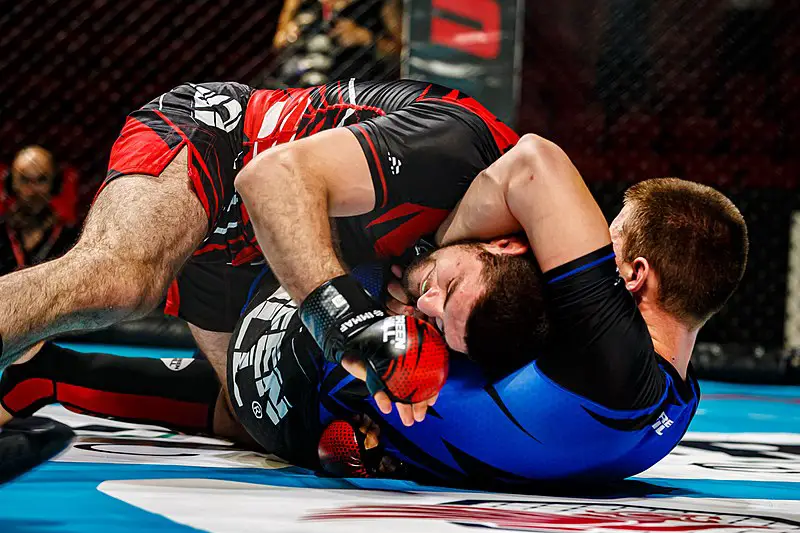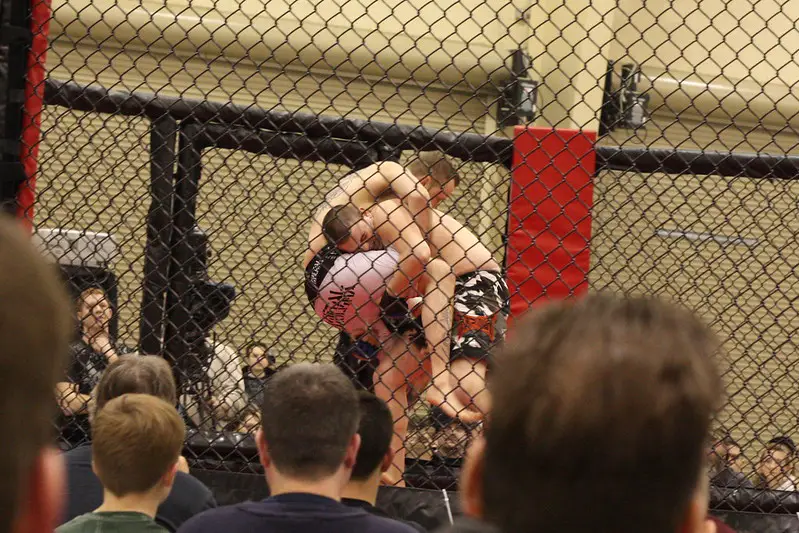UFC contracts and fighter salaries are among the most discussed topics within the MMA community. Are UFC fighters underpaid? How do their contracts work? How much do they earn?
These are some of the questions we are going to answer in this article through a detailed explanation of UFC contracts and fighters’ legal status.
You will also learn why many people thing these contracts are bad, and how underpaid the athletes actually are.
How Do UFC Contract Work?
The way UFC contracts work is simple — fighters agree to compete for X amount of money, X amount of times over the course of X amount of months.
The number of matches in the contract is based on different factors. This includes fighters’ experience, popularity and position in the rankings. Newcomers usually sign 1 or 2 fight deals, while 5 or more fights on the contract are for established fighters and contenders.
When a fighter approaches the end of each contract, they negotiate a new one with the matchmakers. The money they would receive and the number of fights depends on the previous contract. Fighters who show talent and marketing potential can box out better deals and receive special treatment.
Each fighter, regardless of experience and status, is eligible to win the $50.000 post-fight bonus. The UFC is giving between 2 and 4 bonuses to fighters with the most impressive performances. This includes KOs, submissions, or “Fight of the Night”.
However, UFC contracts also include clauses and terms and conditions which many consider restrictive and one-sided in favor of the UFC.
How Often Do UFC Fighters Fight?
Newcomers tend to compete more often. They are yet to prove their worth to the company, so they are more active and ready to jump on every opportunity. While working their way, most low-tier fighters compete 3 times a year, some even more, up to 5 times.
Well-established fighters and contenders take a more measured approach. They usually wait for better opportunities and compete around 2 times a year. Champions and biggest stars usually defend their belt once every year. But there are also examples where they put the belt on the line two or more times. Israel Adesanya did that for instance.
While under the contract, fighters are usually offered 3 fights per year. They do not have to accept every fight though. But if they turn down the fight, their contract automatically extends for an additional 6 months regardless of the reason behind the cancellation.
This means the UFC would keep extending the contract until the fighter completes all the fights they agreed to.
UFC Contract Clauses Explained
The contracts are confidential and the general public doesn’t get to see what is in every single one. However, some contracts became public as a result of various lawsuits. Following is the explanation of how the UFC contract works based on the contracts of Eddie Alvarez and Talia Santos.
Financial Terms
UFC contracts specify the fighter’s compensation structure. This includes a base salary, win bonuses (usually double the base salary), and potential bonuses awarded by the UFC. High-profile fighters like Conor Mcgregor and champions may also negotiate for a % of PPV revenue.
Exclusive Contract
The clause is a fundamental aspect of UFC contracts. It prevents fighters from competing in other MMA promotions during the contract term. This ensures that the UFC has control over the fighter’s services and fight bookings.
Promotional Activities
The company requires fighters to engage in various promo activities to market their fights and the brand. This may include media work, press conferences, and interviews. Failure to fulfil these promotional obligations can result in penalties.
Incidentals
Incidental clauses cover various aspects of the fighters’ demands during the fight week. This could include covering travel costs, accommodation, per diem allowances, or other logistical considerations for fighters during fight week and promo activities.
Ancillary Rights
Upon signing a contract, the fighter grants the UFC their ancillary rights which include image, voice, signature, names, nicknames, and even tattoos for the UFC to promote events and merchandise. Their characters are also in the game developed by EA Sports, for which they receive undisclosed fees.
Fighters can’t use the UFC title without permission to promote themselves. Their work and businesses because intellectual property rights belong to the UFC.
Automatic Extension
Some UFC contracts include a champion clause that automatically extends the contract if the fighter becomes a champion. This extension typically applies for a specified period, often another three years, as long as the fighter holds the championship title.
While the champion clause extends the contract, it may also provide an opportunity for renegotiation of financial terms.
Fight Acceptance and Weight Class
Fighters agree to accept bouts within a specific weight class and against opponents chosen by the promotion. This ensures that the UFC can make matchups that are in the best interest of the promotion and its fans. Fighters may negotiate weight class changes if they feel the need to.
PPV Bonuses
PPV bonuses are often negotiated separately and are tied to the success of PPV events. Fighters with higher drawing power or those involved in high-profile matchups may receive a percentage of the PPV revenue.
Fighter Conduct
Contracts typically include provisions outlining the expected behaviour and conduct of fighters. This could cover actions both inside and outside the Octagon, emphasizing professionalism, adherence to the promotion’s code of conduct, and compliance with anti-doping policies.
Violations of conduct clauses may lead to fines, suspensions, or even termination of the contract, depending on the severity of the offence.
Contract Termination
UFC contracts may include a clause allowing for a mutual termination agreement. If both the fighter and the promotion agree, they can part ways before the contract’s natural expiration.
If either party violates the terms of the contract, the other party may have the right to terminate the agreement. This could include failure to make weight, refusal to fight, or other breaches outlined in the contract.
Lastly, if a fighter sustains a severe injury or faces ongoing medical issues preventing them from competing, the contract may have provisions for termination due to health reasons.
Act of God Clause
The Act of God clause, often categorized under “force majeure,” addresses unforeseen circumstances beyond the control of either party that might prevent the fulfilment of contractual obligations.
Examples may include natural disasters, wars, or other events deemed as acts of God. In such cases, the contract may be temporarily suspended, or other arrangements could be made based on the language of the clause.
UFC Contract Salaries
UFC fighters are paid per fight and in 2 halves. They earn “show money” by making weight and showing up to a fight, and the second half if they win the match. For instance, $20.000 to show up, and another 20 if they win.
There are three income categories based on individual experience, popularity, entertainment value they bring to the company, and many other factors so we have:
- Low-tier fighters, usually newcomers who receive between $12 and $20 thousand to show up and compete on the early or official prelims depending on the card. So the max they can cash out is between $24 and $40 thousand dollars.
- Mid-tier fighters earn anywhere between $40 and $100 to show up and this group includes veterans of the game, hot prospects, and ranked contenders.
- High-paid fighters, mostly champions, and draws, earn no less than $300 thousand on the lower end and as high as a couple of millions on the higher end. Fighters like Mcgregor are rare exceptions, and as far as the fighter pay is concerned, a statistical error.
Each fighter is also eligible to win the $50k bonus, which has been the same for the past decade, and they also receive a small fee from the Venum deal and promotional work like signing posters.
Also, UFC fighters receive a quite low revenue percentage payout which is somewhere between 18 and 20% of the total revenue. This is much less than in other sports like the NFL or NBA whose players receive around 50%, or even other MMA promotions like Bellator that pay roughly 45% of their revenue.
How Much Do UFC Fighters Get Paid on Average?
In 2022, the average UFC fighter made $150,249, $10.000 less than the previous year. It is also important to note that this number does not tell the full story and that 27% of the fighters made less than the median income in the US, which in 2022 was $44,225.
Next, 46% of fighters earned six-figure paychecks while 21 men and women who wore UFC belts cashed out an average of $608,095, almost $70.000 less than the previous year.
When it comes to the show money, only two fighters have managed to cash out more than a million and that is Israel Adesanya who made close to $2 million, and Andrei Arlovski who made 1.1 million. On the other side, there were 70 active fighters who earned less than $20.000, which is quite a big number considering that 608 fighters got paid in 2022 in total.
Between 2010 and 2015 the average annual income was $100 thousand, and between 2015 and 2022 around $150 thousand. But during the same period, the UFC revenue went from around $450 million in 2010 to over $1.1 billion in 2022.
Why UFC Contracts Are Bad For The Fighters?
The main reason is the fact that only between 14 and 16% of UFC’s revenue goes to fighter salaries, less than in other mainstream sports where that number is around 50%. The contracts are also structured in the favor of the company and give fighters little to no space to negotiate or earn more through private sponsors.
While opinions vary, there are several common concerns raised by fighters and critics:
Limited Revenue Share
Fighters often receive a small percentage of the overall revenue generated by events, especially compared to other major sports. The UFC retains a large portion of the revenue for itself, which can be perceived as unfair given the physical risks and efforts put in by the fighters.
Expenses
Committing yourself to the fighting game requires a lot of money. When a fighter cut all the costs off their salary, they are usually left with nothing. The gym fee they pay is 5% while the management fee is 10%. The taxes may vary depending on the brackets, but it is usually between 40–50%. Next, they have to pay for food, travel costs, nutritionists and many other expenses.
Exclusive Contracts
UFC contracts are typically exclusive, meaning that fighters are unable to compete in other promotions simultaneously. This lack of flexibility can limit fighters’ opportunities to maximize their earnings and gain exposure.
No Alternatives
UFC is a monopoly. According to statistics, it holds 90% of the MMA industry. Or in other words, the company earns 90 cents of every dollar generated in the industry. Bellator, ONE FC, RIZIN and other promotions are fighting for the last 10% of the market.
Thus, this enables the UFC to keep the salaries low as fighters don’t have the alternative. They can go to other promotions, but they won’t be legitimate world champions.
Fighter Venum Deal
The UFC’s exclusive apparel deal with Venum has been a contentious issue. The deal mandates that fighters wear Venum gear during fight week and in the Octagon, limiting their ability to secure individual sponsorships. This has resulted in a loss of potential income for many fighters.
For instance, entry-level fighters receive $4.000 while contenders and well-established fighters get up to $11.000. Champions receive $42.000 in fight week incentive pay while the challenger receives $32.000. Although this sounds much, it is much less than what they can earn with their own sponsors.
Popular fighters and champions could easily earn over $100 thousand from their sponsors.
Can UFC Fighters Decline a Fight Offer?
UFC fighters have the legal right to refuse the fight and the UFC can’t force them to compete. Due to the nature of the sport, fighters may have many legitimate and illegitimate reasons to say no to the fight offer. Some of the most common are.
- Medical or Injury Issues: If a fighter is not able to compete due to a legitimate medical or injury-related reason, the UFC and the relevant athletic commission would generally understand and accommodate such situations. In such cases, the fighter may not face any immediate consequences, and the company would try to reschedule the fight when the fighter is fit to compete.
- Private issues — fans often forget that fighters live an ordinary life and have to deal with different private issues. They may cancel the fight because they are going through a divorce, or are going through the process of rebuilding after losing a loved one.
- Short notice — if a fighter receives a short-notice opportunity, they might refuse the offer because they are not in shape or don’t have enough to prepare. The others may avoid jumping on short notice due to the high risks.
Although they have the full right to do so, saying no the UFC comes at a certain cost.
If a fighter declines a proposed matchup without a valid reason, it could affect their standing with the promotion. The UFC will start looking at this fighter as “unreliable” and may choose to release them from their contract or impose other penalties. The company loves athletes who are ready to jump on every opportunity to prove their loyalty, and these athletes usually may expect a lot in return.
Do UFC Fighters Get Paid If They Miss Weight?
Yes, but not without financial consequences. When a fighter steps on the scale and misses weight, the UFC would set up a catch-weight fight and the fighter who missed the scale needs to give 20% of their fight purse to their opponent as compensation for the unprofessionalism.
Ultimately, it all depends on whether the fight is still on. In that case, both fighters would get paid with the one making the right weight earning 20% more. If the opponent rejects the offer to fight at catchweight or the Athletic Commission doesn’t approve it, the fight is off and there is no financial compensation. Both fighters go home with empty pockets.
In most cases, the UFC is able to save the match under new circumstances. However, there are rare exceptions where the match is off.
Do UFC Fighters Get Paid If the Fight Gets Canceled?
UFC contracts do not obligate the company to pay fighters for a cancelled fight. It doesn’t matter if the match falls apart weeks before the event or hours, the company doesn’t need to pay the fighters. This is mainly because athletes are not employees but independent contractors.
However, the UFC prefers to solve these issues behind closed doors. In most cases, if the reason behind cancellation is legitimate, both fighters or at least one of them would receive financial compensation. However, the amount they receive is not public.
For instance, if a fight falls apart due to reasons such as an injury or withdrawal by one of the fighters, the opponent who is ready to fight might still receive their show money, or at least a part of it.
Are UFC Contracts Public?
Detailed copies of UFC fighter contracts are not publicly available. UFC contracts are typically confidential documents between the fighters and the organization.
However, there have been instances where certain details or general information about UFC contracts have been discussed publicly. For instance, some UFC contracts were released in public as a result of the ongoing anti-trust lawsuit the company has with different fighters. One such contract is the one involving Taila Jaine Dos Santos which you can check out HERE.
Final Thoughts on UFC Contracts
UFC contracts are deals where fighters agree to compete for a certain amount of money and fights. These contracts include terms like exclusive agreements, promotional duties, and even clauses about unforeseen events.
The pay varies a lot, with some fighters earning more based on their popularity and experience. However, there are concerns about the contracts being one-sided, limiting how much fighters get from the overall earnings. Fighters can say no to a fight, but it might affect their standing with the UFC. Despite the challenges, it’s important for the UFC and fighters to have clear and fair agreements for a better working relationship.


